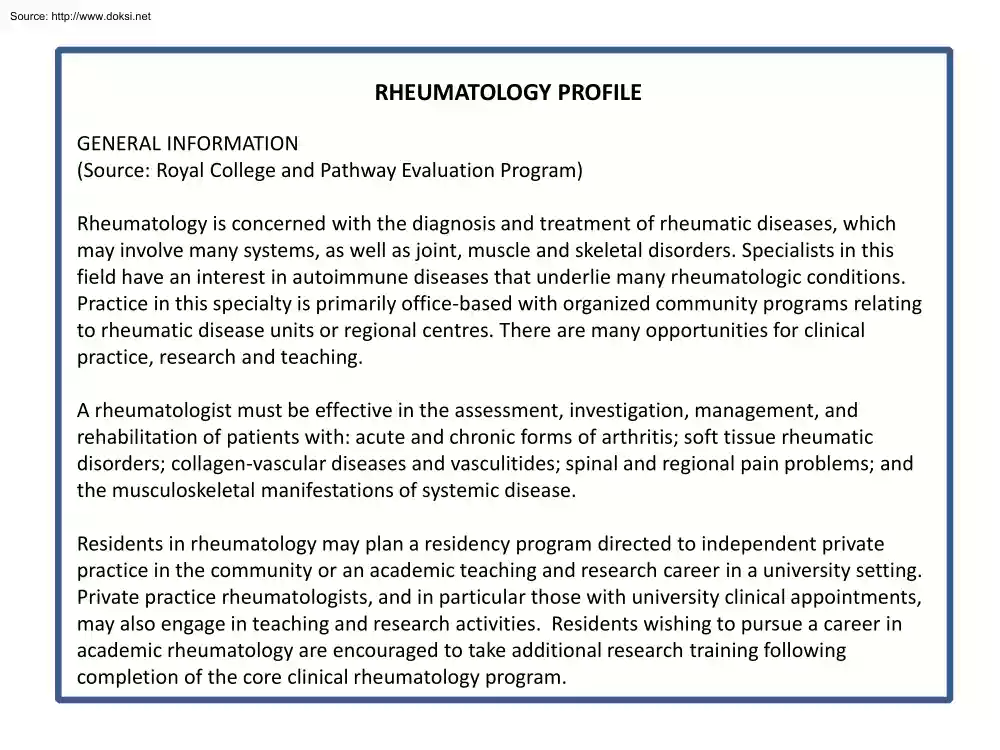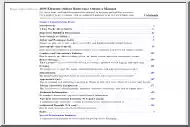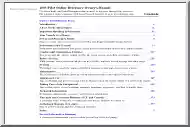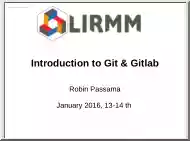Comments
No comments yet. You can be the first!
Content extract
Source: http://www.doksinet RHEUMATOLOGY PROFILE GENERAL INFORMATION (Source: Royal College and Pathway Evaluation Program) Rheumatology is concerned with the diagnosis and treatment of rheumatic diseases, which may involve many systems, as well as joint, muscle and skeletal disorders. Specialists in this field have an interest in autoimmune diseases that underlie many rheumatologic conditions. Practice in this specialty is primarily office-based with organized community programs relating to rheumatic disease units or regional centres. There are many opportunities for clinical practice, research and teaching. A rheumatologist must be effective in the assessment, investigation, management, and rehabilitation of patients with: acute and chronic forms of arthritis; soft tissue rheumatic disorders; collagen-vascular diseases and vasculitides; spinal and regional pain problems; and the musculoskeletal manifestations of systemic disease. Residents in rheumatology may plan a residency
program directed to independent private practice in the community or an academic teaching and research career in a university setting. Private practice rheumatologists, and in particular those with university clinical appointments, may also engage in teaching and research activities. Residents wishing to pursue a career in academic rheumatology are encouraged to take additional research training following completion of the core clinical rheumatology program. Source: http://www.doksinet Traditionally, pediatric patients (usually under age 18) are attended to by pediatricians with subspecialty training in pediatric rheumatology. Adult patients (usually over age 18) are attended to by internists with subspecialty training in adult rheumatology. Therefore, upon completion of medical school, a resident in rheumatology must first have primary certification in internal medicine or pediatrics. Certification training therefore takes approximately 6 years, including: • 4 years for
certification in either internal medicine or pediatrics; • a further 2 years of Royal College-approved residency in adult or pediatric rheumatology, a maximum of 1 year of which may be undertaken at the third or fourth year residency level. This period must include: 1 year of Royal College-approved clinical residency at a senior level in adult or pediatric rheumatology and a further residency that may include the following: 6 or 12 months of Royal College-approved clinical residency in rheumatology; and 6 or 12 months of approved clinical or basic research training relevant to rheumatology; or 1 year of Royal College-approved residency or research at a hospital or institution in Canada. For further training requirements go to: http://www.royalcollegeca/portal/page/portal/rc/credentials/start/routes/traditional route Canadian Rheumatology Association http://rheum.ca/ Source: http://www.doksinet Number of physicians and physicians/100,000 population in Rheumatology in Canada, 2015
Province/Territory Physicians Phys/100k pop'n Newfoundland/Labrador 5 0.9 Prince Edward Island 0 0.0 Nova Scotia 14 1.5 New Brunswick 7 0.9 Quebec 106 1.3 Ontario 154 1.1 Manitoba 11 0.9 Saskatchewan 7 0.6 Alberta 39 0.9 British Columbia 55 1.2 Territories 0 0.0 CANADA 398 1.1 Source: 2015 CMA Masterfile Source: http://www.doksinet Physicians/100,000 population in Rheumatology in Canada, 1995 to 2015 1.2 1.1 1.0 0.9 0.8 0.7 0.6 0.5 1995 1997 1999 Source: CMA Masterfile 2001 2003 2005 2007 2009 2011 2013 2015 Source: http://www.doksinet Rheumatologists by gender and year in Canada, 1995 to 2015 450 400 350 300 250 200 150 100 50 0 1995 1997 1999 2001 Total Source: CMA Masterfile 2003 2005 Males 2007 2009 Females 2011 2013 2015 Source: http://www.doksinet Rheumatologists by age and gender in Canada, 2015 Gender Age Group 34 and under 3% 65 and over 15% Male 50% Female 50% Source: 2015 CMA
Masterfile 55 - 64 31% 35 - 44 26% 45 - 54 25% Source: http://www.doksinet Rheumatologists by age and gender in Canada, 2015 65 and over 8 49 55-64 48 45-54 53 35-44 34 and Under 70 42 70 11 31 2 Female Source: 2015 CMA Masterfile Male Source: http://www.doksinet Main work setting of Rheumatologists in Canada, 2014 Private Office/Clinic 44% Academic Health Sciences Centre 42% Nursing home/ long term care facility/ seniors’ residence 5% Non-AHSC Teaching Hospital 4% Community Hospital 3% Free-standing Lab/Diag Clinic 2% Source: 2014 National Physician Survey. CFPC, CMA, Royal College Source: http://www.doksinet Practice organization for Rheumatologists in Canada, 2014 31% 55% Solo Practice Group Practice Interprofessional Practice 10% 4% Source: 2014 National Physician Survey. CFPC, CMA, Royal College Hospital-based Practice NR Source: http://www.doksinet Hours worked per week (excluding on-call) by Rheumatologists in Canada, 2014
Activity Hours worked per week Direct patient care without teaching component 19.7 Direct patient care with teaching component 10.3 Teaching without patient care 3.1 Indirect patient care 8.6 Health facility committees 1.1 Administration 1.8 Research 4.6 Managing practice 1.5 Continued professional development 3.2 Other 0.7 TOTAL HOURS PER WEEK 54.6 Source: 2014 National Physician Survey. CFPC, CMA, Royal College Source: http://www.doksinet On-call duty hours spent per month by Rheumatologists in Canada, 2014 2% 10% Up to 120 hrs/month 28% More than 120, up to 180 hrs/month 60% More than 180, up to 240 hrs/month More than 240 hrs/month No response Time spent on call in direct patient care = 29 hrs./month Source: 2014 National Physician Survey. CFPC, CMA, Royal College Source: http://www.doksinet Remuneration for Rheumatologists in Canada Primary payment method1 in 2013 2% 32% 53% Average gross clinical earnings for Int Med & subspecialties in
2013/14 (those earning at least $60,000) = $396,1052 4% Average percent overhead reported by Internal Medicine specialists in 2010 = 22%3 9% 90% + fee-for-service 90% + salary 90% + other* Blended NR * Other includes capitation, sessional, contract and other methods 1 National Physician Survey, 2013, CFPC, CMA, Royal College 2 National Physician Database, 2013/14, CIHI 3 National Physician Survey, 2010, CFPC, CMA, Royal College Source: http://www.doksinet Satisfaction among Rheumatologists in Canada, 2013 Balance of personal & professional commitments 4% 3% 20% Current professional life 4% 7% 6% NR Very dissatisfied 20% 43% 56% Dissatisfied 11% 27% Neutral Satisfied Source: 2013 National Physician Survey. CFPC, CMA, Royal College Very satisfied Source: http://www.doksinet Rheumatologists who are Royal College, CFPC or CMQ certified in Canada, 2014 100% Royal College CFPC 9% 6% CMQ Outside Canada Note: Subset of those who reported a
certification. Physicians could indicate more than one certification body. Source: 2014 National Physician Survey. CFPC, CMA, Royal College Source: http://www.doksinet Number of Rheumatologists who retired in Canada during the THREE year period of 2012 to 2014 Males Females 4 4 3 2 1 < 35 35-44 45-54 55-64 Age Group 65 + Total Source: CMA Masterfile – year over year comparisons Note: “Retired” is based on giving up licence and is therefore excludes those who have retired from clinical practice but are still licensed; it includes physicians who have temporarily given up their licence but may return to practice at a later date. Source: http://www.doksinet Total and Ministry funded postgraduate MD trainees in 2014/15 – Rheumatology* Faculty of Medicine Ministry funded Total Memorial U N&L 0 0 Dalhousie U 1 U Laval Faculty of Medicine Ministry funded Total McMaster U 5 7 1 UWO 5 6 1 1 NOSM 0 0 U Sherbrooke 4 4 U Manitoba 1 1 U
Montréal 3 3 U Sask 2 2 McGill U 7 8 U Alberta 5 5 U Ottawa 1 2 U Calgary 3 4 Queens U 2 4 UBC 7 11 U Toronto 10 41 Canada 57 100 * Includes Rheumatology (Int Med) and Rheumatology (Ped) Source: 2014/15 Annual Census of Post-MD Trainees, CAPER Source: http://www.doksinet PGY-4 and exiting postgraduate-MD trainees in 2014/15 – Rheumatology 36 36 7 10 18 23 21 Female 18 Male IMG GCMS 24 18 8 7 0 0 PGY-4 Exits from postgrad PGY-4 Postgrad exits IMG – International Medical Graduates GCMS – Graduates of Canadian Medical Schools Source: 2014/15 Annual Census of Post-MD Trainees, CAPER Source: http://www.doksinet Postgraduate-MD trainees in 2014/15 – Rheumatology • Total of 31 PGY-4 Rheumatology trainees representing 54% of all Rheumatology trainees. • Total of 57 Rheumatology trainees representing 0.5% of all Ministry funded trainees. • Total of 32 visa trainees in Rheumatology. • Total of 28 Rheumatology trainees
completed postgraduate training in 2014. Source: 2014/15 Annual Census of Post-MD Trainees, CAPER Source: http://www.doksinet Location of 2013 Postgraduate-MD exits in 2015 – Rheumatology 15 12 10 10 5 4 3 4 1 0 Of the 34 exits in 2013, 30 (88%) were known to be practising in Canada Source: 2014/15 Annual Census of Post-MD Trainees, CAPER Source: http://www.doksinet Stress associated with finding employment at end of residency FM resident 7% Other spec res 6% NR/NA 42% 43% 20% Not stressful 8% 50% Somewhat stressful 25% Very stressful Source: 2012 National Physician Survey of residents. CFPC, CMA, Royal College Source: http://www.doksinet Links to the organizations supplying information for this document National Physician Survey http://www.nationalphysiciansurveyca Canadian Medical Association http://www.cmaca/c3pr Association of Faculties of Medicine of Canada http://www.caperca/ Royal College of Physicians and Surgeons of Canada
http://www.royalcollegeca/portal/page/portal/rc/credentials/start/routes/traditional route College of Family Physicians of Canada http://www.cfpcca Canadian Institute for Health Information http://www.cihica
program directed to independent private practice in the community or an academic teaching and research career in a university setting. Private practice rheumatologists, and in particular those with university clinical appointments, may also engage in teaching and research activities. Residents wishing to pursue a career in academic rheumatology are encouraged to take additional research training following completion of the core clinical rheumatology program. Source: http://www.doksinet Traditionally, pediatric patients (usually under age 18) are attended to by pediatricians with subspecialty training in pediatric rheumatology. Adult patients (usually over age 18) are attended to by internists with subspecialty training in adult rheumatology. Therefore, upon completion of medical school, a resident in rheumatology must first have primary certification in internal medicine or pediatrics. Certification training therefore takes approximately 6 years, including: • 4 years for
certification in either internal medicine or pediatrics; • a further 2 years of Royal College-approved residency in adult or pediatric rheumatology, a maximum of 1 year of which may be undertaken at the third or fourth year residency level. This period must include: 1 year of Royal College-approved clinical residency at a senior level in adult or pediatric rheumatology and a further residency that may include the following: 6 or 12 months of Royal College-approved clinical residency in rheumatology; and 6 or 12 months of approved clinical or basic research training relevant to rheumatology; or 1 year of Royal College-approved residency or research at a hospital or institution in Canada. For further training requirements go to: http://www.royalcollegeca/portal/page/portal/rc/credentials/start/routes/traditional route Canadian Rheumatology Association http://rheum.ca/ Source: http://www.doksinet Number of physicians and physicians/100,000 population in Rheumatology in Canada, 2015
Province/Territory Physicians Phys/100k pop'n Newfoundland/Labrador 5 0.9 Prince Edward Island 0 0.0 Nova Scotia 14 1.5 New Brunswick 7 0.9 Quebec 106 1.3 Ontario 154 1.1 Manitoba 11 0.9 Saskatchewan 7 0.6 Alberta 39 0.9 British Columbia 55 1.2 Territories 0 0.0 CANADA 398 1.1 Source: 2015 CMA Masterfile Source: http://www.doksinet Physicians/100,000 population in Rheumatology in Canada, 1995 to 2015 1.2 1.1 1.0 0.9 0.8 0.7 0.6 0.5 1995 1997 1999 Source: CMA Masterfile 2001 2003 2005 2007 2009 2011 2013 2015 Source: http://www.doksinet Rheumatologists by gender and year in Canada, 1995 to 2015 450 400 350 300 250 200 150 100 50 0 1995 1997 1999 2001 Total Source: CMA Masterfile 2003 2005 Males 2007 2009 Females 2011 2013 2015 Source: http://www.doksinet Rheumatologists by age and gender in Canada, 2015 Gender Age Group 34 and under 3% 65 and over 15% Male 50% Female 50% Source: 2015 CMA
Masterfile 55 - 64 31% 35 - 44 26% 45 - 54 25% Source: http://www.doksinet Rheumatologists by age and gender in Canada, 2015 65 and over 8 49 55-64 48 45-54 53 35-44 34 and Under 70 42 70 11 31 2 Female Source: 2015 CMA Masterfile Male Source: http://www.doksinet Main work setting of Rheumatologists in Canada, 2014 Private Office/Clinic 44% Academic Health Sciences Centre 42% Nursing home/ long term care facility/ seniors’ residence 5% Non-AHSC Teaching Hospital 4% Community Hospital 3% Free-standing Lab/Diag Clinic 2% Source: 2014 National Physician Survey. CFPC, CMA, Royal College Source: http://www.doksinet Practice organization for Rheumatologists in Canada, 2014 31% 55% Solo Practice Group Practice Interprofessional Practice 10% 4% Source: 2014 National Physician Survey. CFPC, CMA, Royal College Hospital-based Practice NR Source: http://www.doksinet Hours worked per week (excluding on-call) by Rheumatologists in Canada, 2014
Activity Hours worked per week Direct patient care without teaching component 19.7 Direct patient care with teaching component 10.3 Teaching without patient care 3.1 Indirect patient care 8.6 Health facility committees 1.1 Administration 1.8 Research 4.6 Managing practice 1.5 Continued professional development 3.2 Other 0.7 TOTAL HOURS PER WEEK 54.6 Source: 2014 National Physician Survey. CFPC, CMA, Royal College Source: http://www.doksinet On-call duty hours spent per month by Rheumatologists in Canada, 2014 2% 10% Up to 120 hrs/month 28% More than 120, up to 180 hrs/month 60% More than 180, up to 240 hrs/month More than 240 hrs/month No response Time spent on call in direct patient care = 29 hrs./month Source: 2014 National Physician Survey. CFPC, CMA, Royal College Source: http://www.doksinet Remuneration for Rheumatologists in Canada Primary payment method1 in 2013 2% 32% 53% Average gross clinical earnings for Int Med & subspecialties in
2013/14 (those earning at least $60,000) = $396,1052 4% Average percent overhead reported by Internal Medicine specialists in 2010 = 22%3 9% 90% + fee-for-service 90% + salary 90% + other* Blended NR * Other includes capitation, sessional, contract and other methods 1 National Physician Survey, 2013, CFPC, CMA, Royal College 2 National Physician Database, 2013/14, CIHI 3 National Physician Survey, 2010, CFPC, CMA, Royal College Source: http://www.doksinet Satisfaction among Rheumatologists in Canada, 2013 Balance of personal & professional commitments 4% 3% 20% Current professional life 4% 7% 6% NR Very dissatisfied 20% 43% 56% Dissatisfied 11% 27% Neutral Satisfied Source: 2013 National Physician Survey. CFPC, CMA, Royal College Very satisfied Source: http://www.doksinet Rheumatologists who are Royal College, CFPC or CMQ certified in Canada, 2014 100% Royal College CFPC 9% 6% CMQ Outside Canada Note: Subset of those who reported a
certification. Physicians could indicate more than one certification body. Source: 2014 National Physician Survey. CFPC, CMA, Royal College Source: http://www.doksinet Number of Rheumatologists who retired in Canada during the THREE year period of 2012 to 2014 Males Females 4 4 3 2 1 < 35 35-44 45-54 55-64 Age Group 65 + Total Source: CMA Masterfile – year over year comparisons Note: “Retired” is based on giving up licence and is therefore excludes those who have retired from clinical practice but are still licensed; it includes physicians who have temporarily given up their licence but may return to practice at a later date. Source: http://www.doksinet Total and Ministry funded postgraduate MD trainees in 2014/15 – Rheumatology* Faculty of Medicine Ministry funded Total Memorial U N&L 0 0 Dalhousie U 1 U Laval Faculty of Medicine Ministry funded Total McMaster U 5 7 1 UWO 5 6 1 1 NOSM 0 0 U Sherbrooke 4 4 U Manitoba 1 1 U
Montréal 3 3 U Sask 2 2 McGill U 7 8 U Alberta 5 5 U Ottawa 1 2 U Calgary 3 4 Queens U 2 4 UBC 7 11 U Toronto 10 41 Canada 57 100 * Includes Rheumatology (Int Med) and Rheumatology (Ped) Source: 2014/15 Annual Census of Post-MD Trainees, CAPER Source: http://www.doksinet PGY-4 and exiting postgraduate-MD trainees in 2014/15 – Rheumatology 36 36 7 10 18 23 21 Female 18 Male IMG GCMS 24 18 8 7 0 0 PGY-4 Exits from postgrad PGY-4 Postgrad exits IMG – International Medical Graduates GCMS – Graduates of Canadian Medical Schools Source: 2014/15 Annual Census of Post-MD Trainees, CAPER Source: http://www.doksinet Postgraduate-MD trainees in 2014/15 – Rheumatology • Total of 31 PGY-4 Rheumatology trainees representing 54% of all Rheumatology trainees. • Total of 57 Rheumatology trainees representing 0.5% of all Ministry funded trainees. • Total of 32 visa trainees in Rheumatology. • Total of 28 Rheumatology trainees
completed postgraduate training in 2014. Source: 2014/15 Annual Census of Post-MD Trainees, CAPER Source: http://www.doksinet Location of 2013 Postgraduate-MD exits in 2015 – Rheumatology 15 12 10 10 5 4 3 4 1 0 Of the 34 exits in 2013, 30 (88%) were known to be practising in Canada Source: 2014/15 Annual Census of Post-MD Trainees, CAPER Source: http://www.doksinet Stress associated with finding employment at end of residency FM resident 7% Other spec res 6% NR/NA 42% 43% 20% Not stressful 8% 50% Somewhat stressful 25% Very stressful Source: 2012 National Physician Survey of residents. CFPC, CMA, Royal College Source: http://www.doksinet Links to the organizations supplying information for this document National Physician Survey http://www.nationalphysiciansurveyca Canadian Medical Association http://www.cmaca/c3pr Association of Faculties of Medicine of Canada http://www.caperca/ Royal College of Physicians and Surgeons of Canada
http://www.royalcollegeca/portal/page/portal/rc/credentials/start/routes/traditional route College of Family Physicians of Canada http://www.cfpcca Canadian Institute for Health Information http://www.cihica





 When reading, most of us just let a story wash over us, getting lost in the world of the book rather than paying attention to the individual elements of the plot or writing. However, in English class, our teachers ask us to look at the mechanics of the writing.
When reading, most of us just let a story wash over us, getting lost in the world of the book rather than paying attention to the individual elements of the plot or writing. However, in English class, our teachers ask us to look at the mechanics of the writing.